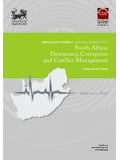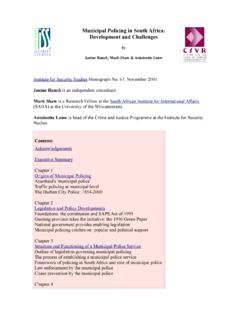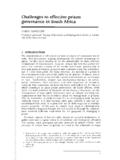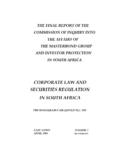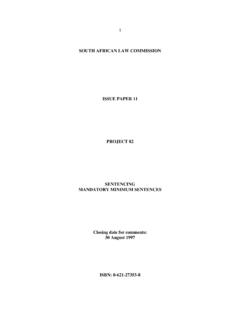Transcription of THE SUPREME COURT OF APPEAL OF SOUTH AFRICA
1 REPORTABLETHE SUPREME COURT OF APPEALOF SOUTH AFRICA Case No: 117/2000In the matter betweenHENNA MALGASA ppellantandTHE STATER espondentCORAM:HARMS, MARAIS, CAMERON JJA CHETTY et MTHIYANEAJJADATE HEARD:16 February 2001 DATE DELIVERED:19 March 2001 Minimum sentences for certain serious offences - murder - life imprisonment - s 51(3)(a)Act 51 of 1977 - substantial and compelling circumstances justifying lesser sentence -interpretation of MARAIS JA21J Hogarth, Sentencing as a Human Process (1971) U. of TorontoP., (Cited in Stockdale and Devlin on Sentencing, 1987, p 8).
2 MARAIS JA: [1] Judicial hostility to legislative prescriptions which stripcourts of their sentencing discretion is hardly surprising. Given the infinite varietyof circumstances which attend the commission of crimes, who are better placedthan the courts, which experience daily the complexities of imposing sentenceswhich are as just as human fallibility can make them, to understand the arbitrarinessand potential unjustness of such edicts? Sentencing has rightly been described as a lonely and onerous task 1. For those who must shoulder that responsibility insociety s name, to have to impose a statutorily decreed sentence which ismanifestly unjust in the particular circumstances of the case is a monstrous thing.
3 [2] That said, there is a significant distinction between, on the one hand, alegislative provision which does in truth deprive a COURT of any sentencing discretionat all, or so attenuates it that its existence is illusory, and, on the other, one which3fetters only partially the exercise of the discretion and leaves it otherwise largelyintact. Ritualistic incantations of the doctrine of the separation of powers to justifyresistance to any form of legislative intervention in this regard seem to me to lackplausibility. Subject of course to constraints going to substance imposed by theConstitution, Parliament is obviously empowered to create new offences andabolish old ones (whether they were statutorily created or originated in the commonlaw) and to provide for the penalties courts may impose.
4 It may, and does, limitthe sentencing powers of courts in a variety of ways. The types of sentence whichmay be imposed may be laid down, for example, those listed in s 276 of theCriminal Procedure Act 51 of 1977. A maximum penalty of one kind or anothermay be specified. Even in those countries where the doctrine of the separation ofpowers is an article of faith, legislatures have been doing such things for generationswithout protest from the judiciary or the citizenry. No COURT exercising criminaljurisdiction in SOUTH AFRICA could convincingly claim to be the sole constitutional42S v Toms; S v Bruce 1990 (2) SA 802 (A) at 806H - of power to do such things.
5 Indeed, the courts have no inherent powerto do any such thing. They cannot create new crimes. Nor can they invent a newkind of penalty such as, for example, physical detention under lock and key atsome place other than a prison.[3] What is rightly regarded as an unjustifiable intrusion by the legislatureupon the legitimate domain of the courts, is legislation which is so prescriptive inits terms that it leaves a COURT effectively with no sentencing discretion whatsoeverand obliges it to pass a specific sentence which, judged by all normal and well-established sentencing criteria, could be manifestly unjust in the circumstances ofa particular case.
6 Such a sentencing provision can accurately be described as amandatory provision in the pejorative sense intended by opponents of legislativeincursions into this A provision which leaves the courts free to exercise asubstantial measure of judicial discretion is not, in my opinion, properly described5as a mandatory provision in that sense. As I see it, this case is concerned withsuch a provision. [4] Sections 51 and 53 of the Criminal Law Amendment Act 105 of 1997provide: 51. Minimum sentences for certain serious offences.
7 - (1) Notwithstanding any other law but subject to subsections (3) and (6), a High Courtshall, if it has convicted a person of an offence referred to in Part I of Schedule 2,sentence the person to imprisonment for life.(2) Notwithstanding any other law but subject to subsections (3) and (6),a regional COURT or a High COURT shall -(a)if it has convicted a person of an offence referred to in Part II ofSchedule 2, sentence the person in the case of - (i)a first offender, to imprisonment for a period not less than 15years;(ii)a second offender of any such offence, to imprisonment for aperiod not less than 20 years; and(iii)a third or subsequent offender of any such offence, toimprisonment for a period not less than 25 years.
8 (b)if it has convicted a person of an offence referred to in Part III ofSchedule 2, sentence the person, in the case of -(i)a first offender, to imprisonment for a period not less than 10years;(ii)a second offender of any such offence, to imprisonment for aperiod not less than 15 years; and6(iii)a third or subsequent offender of any such offence, toimprisonment for a period not less than 20 years; and(c)if it has convicted a person of an offence referred to in Part IV ofSchedule 2, sentence the person, in the case of -(i)a first offender, to imprisonment for a period not less than 5years;(ii)a second offender of any such offence, to imprisonment for aperiod not less than 7 years.
9 And(iii)a third or subsequent offender of any such offence, toimprisonment for a period not less than 10 years:Provided that the maximum sentence that a regional COURT may impose interms of this subsection shall not be more than five years longer than theminimum sentence that it may impose in terms of this subsection;(3)(a) If any COURT referred to in subsection (1) or (2) is satisfied that substantial and compelling circumstances exist which justify theimposition of a lesser sentence than the sentence prescribed in thosesubsections, it shall enter those circumstances on the record of theproceedings and may thereupon impose such lesser sentence.
10 (b)If any COURT referred to in subsection (1) or (2) decides to impose asentence prescribed in those subsections upon a child who was 16years of age or older; but under the age of 18 years, at the time of thecommission of the act which constituted the offence in question, itshall enter the reasons for its decision on the record of theproceedings.(4) Any sentence contemplated in this section shall be calculated from thedate of sentence.(5) The operation of a sentence imposed in terms of this section shall notbe suspended as contemplated in section 297(4) of the Criminal Procedure Act,1977 (Act 51 of 1977).










